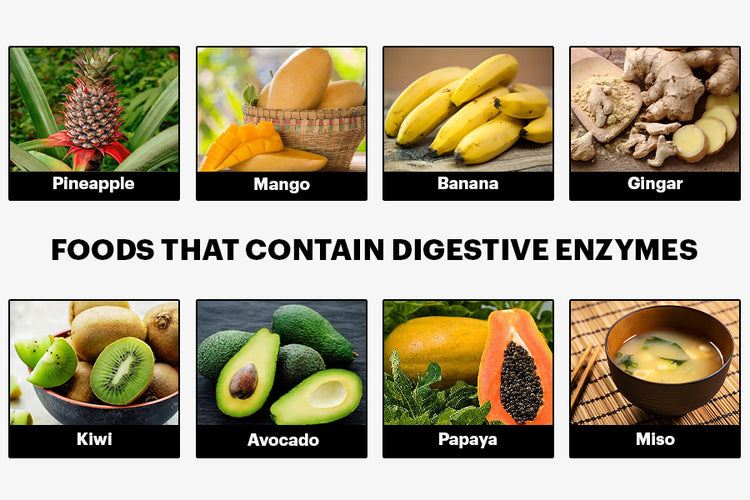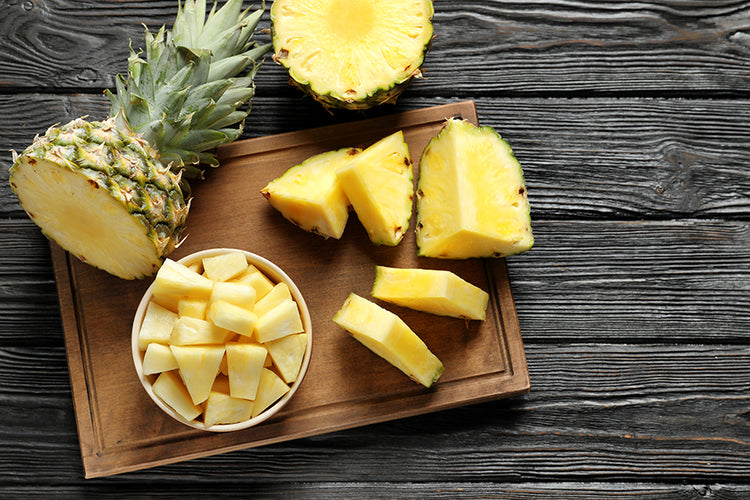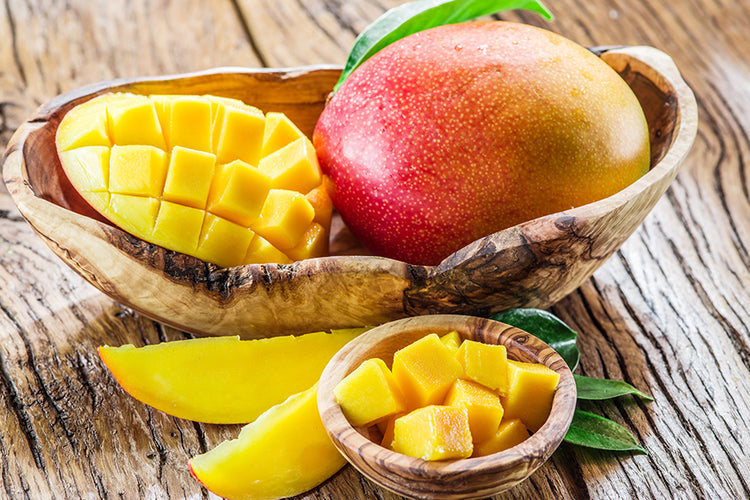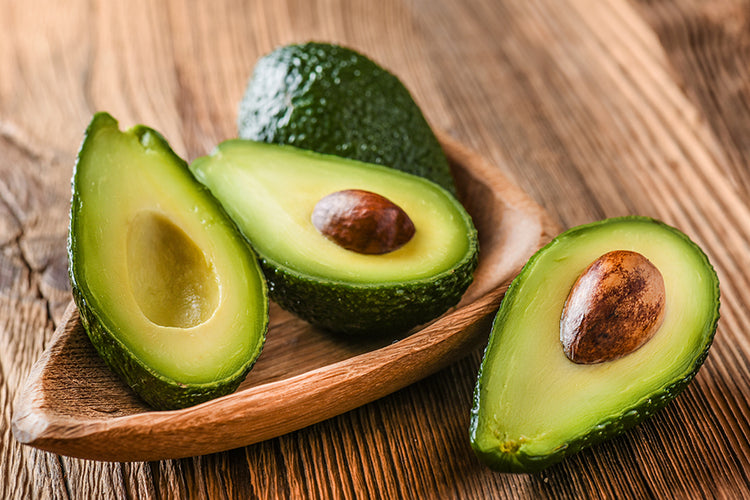You know that feeling when you're drooling over a bowl of ice cream or bean burrito, but the after-effects seem daunting? Fear not, my lactose-intolerant and gas-prone friends! You've probably already used digestive enzymes-those miraculous pills that work behind the scenes to help your body break down all the good stuff in your food.
Wouldn't it be great if pill popping could lead to effortless weight loss? Unfortunately, the reality is a bit more complex regarding digestive enzymes. Digestive enzymes can help improve your nutrient absorption and ensure healthy digestion. In addition, they can also help overcome conditions like irritable bowel syndrome (IBS) & lactose intolerance.
Because of its role in food absorption, many wonder if digestive enzymes can help with weight loss. This article not only explains the health benefits of digestive enzymes, including enzymes' role in weight loss and foods containing digestive enzymes but also describes the role of supplements. So, let's dig in and separate fact from fiction.
What Are Digestive Enzymes?

Digestive enzymes are compounds that play a significant role in breaking down and converting the food that you eat. These proteins are also responsible for enhancing the rate of the chemical reactions that help turn the nutrients into components your digestive tract can easily absorb.
Do you know that your saliva consists of digestive enzymes? Further, some organs, such as the pancreas, liver, and gallbladder, also release digestive enzymes. Not only this, but the cells within the wall of the intestine also store digestive enzymes.
And different types of digestive enzymes break down different nutrients. Let's explore further the three main types of digestive enzymes are:
- Amylase breaks down starches and complex carbs into simple sugar.
- Protease breaks down proteins into amino acids.
- Lipase handles lipids and breaks them into glycerol and fatty acids.
While your body naturally releases digestive enzymes, they are also taken in supplement form. Digestive enzymes help treat severe digestive conditions such as IBS and celiac diseases when taken in supplement form. The health benefits of digestive enzymes are discussed in detail in the next section.
Why Digestive Enzymes
Are you tired of feeling uncomfortable and bloated after meals? Say goodbye to digestive discomfort and hello to improved digestion with the benefits of digestive enzymes! These little powerhouses help break down food more efficiently, so you can enjoy your favorite meals without the dreaded bloat.
Here are some of the scientifically proven health benefits of digestive enzymes:
It May Impact Gut Bacteria
According to a research study, digestive enzymes can help improve the gut microbiome, the microorganisms in your digestive tract. Another study examined the impact of pairing a probiotic supplement with digestive enzymes.
The study revealed that probiotics and digestive enzymes could help protect the body against an unhealthy gut microbiome caused by medications and antibiotics. Some studies have also suggested that a healthy gut microbiome can help with weight control.
According to a review, an increased amount of the beneficial bacteria in your gut may help reduce body weight and fat mass.
Support Weight Loss
Digestive enzyme inhibitors can help treat obesity by decreasing the absorption of some macronutrients. A review suggests that supplementing with amylase extracted from white beans may speed up the process of fat and weight loss among humans.
Similarly, a lipase inhibitor, orlistat, can reduce fat absorption, resulting in noticeable weight loss. According to a study, lipase inhibitors may help reduce fat absorption by 30% by minimizing lipase production in the pancreas and stomach, resulting in weight loss.
A study conducted on 40 obese women revealed that using orlistat for a prolonged period could help suppress appetite and hunger by increasing specific hormones in the body.
May Help Alleviate the Symptoms of Irritable Bowel Syndrome (IBS)
When food is not broken down entirely in the digestive tract, the bacterium in your digestive tract is congested and overfed. As a result, it prompts gas, swelling, loose bowels, and other expected effects of IBS.
However, some sources suggest that a digestive enzyme, Pancrelipase, can help alleviate symptoms of IBS and other conditions that are caused due to inflammation in your gut.
Besides, preliminary studies have concluded that appropriate digestive enzymes can help overcome food sensitivities and conditions like lactose intolerance.
Ensure a Healthy Inflammatory Response
The proteolytic enzymes, such as Bromelain, papain, trypsin, chymotrypsin, and papain, help break down proteins into amino acids or polypeptides. The biological catalyst, protease, also helps digest the proteins in poultry, nuts, meats, and eggs.
As protease ensures that protein is highly bioavailable, they are essential for many protein interactions, such as improving immune functions and ensuring a healthy inflammatory response.
In clinical studies including more than 570 patients with IBS and IBD (Inflammatory Bowel Disease), the digestive enzyme supplement helped improve the symptoms such as bloating, constipation, painful bowel movements, and stomach pain.
May Help Overcome Pain and Chronic Fatigue
Inflammation is the root cause of pain and health problems. The inflammation in your gut causes pain like migraines and headaches. However, by ensuring smooth digestion, the digestive enzymes reduce inflammation in your gut, decreasing pain and fatigue.
May Help Reduce Cancer Symptoms & Side Effects of Chemotherapy
The result suggests that digestive enzymes may be beneficial in reducing cancer symptoms and minimizing the side effects of chemotherapy. Clinical studies with more than 2500 cancer patients showed that digestive enzyme supplements helped overcome cancer-related gut disturbances.
In addition, digestive enzyme supplements also help reduce the side effects of chemotherapy and radiotherapy. Now that you know the benefits of digestive enzymes, you must learn about foods rich in natural digestive enzymes that can help improve your digestion. The following section refers to foods containing digestive enzymes.
Related Article: Weight Loss: Can You Achieve Your Goal With Exercise Only?
Foods That Contain Digestive Enzymes

Digestive Enzymes: Delicious Foods That Can Help!
Have you heard of it? Certain foods contain enzymes that can boost your digestive system, and no, we are not talking about pills or supplements. We're talking yummy, everyday foods like pineapples, avocados, and ginger!
So forget those bland digestive aids; check out our list of tasty foods that will keep your tummy happy and healthy. Your taste buds will thank you!
Pineapple

Pineapples contain digestive enzymes known as Bromelain. These enzymes help break down protein into amino acids, aiding in protein digestion and absorption.
According to a study on persons with pancreatic insufficiency, Bromelain combined with a pancreatic enzyme supplement enhanced digestion, a condition in which the pancreas cannot produce enough digestive enzymes.
Honey

Honey is another vital source of digestive enzymes. The enzymes found in honey, especially raw honey, include proteases, amylases, diastases, and invertases.
Proteases are enzymes that help break down proteins into amino acids. Amylases break down starch into sugars such as glucose and maltose. Diastases help break down starch into maltose. Invertases are enzymes that break down sugars like sucrose into glucose and fructose.
If you're looking for digestive health benefits, get raw honey. Heat is frequently used to process honey, and high heat can disrupt digestive enzymes.
Mangoes

Mangoes contain digestive enzyme amylases that help break down carbs into sugar like glucose and maltose. As a result, carbs can be easily digested by your body.
Amylase enzymes in saliva help break down the carbs portion of your food for faster digestion and absorption, so chewing meals extensively before swallowing is highly recommended.
Bananas
Bananas contain digestive enzymes, amylases, and glucosidases. These digestive enzymes help break down complex carbs into easily absorbed sugar. According to a study, eating bananas also helps increase healthy gut bacteria and reduce bloating.
Papaya
Papayas contain a different group of proteases called papain that helps digest proteins. A study suggests that papaya-based digestive enzyme formula may help alleviate digestive symptoms such as bloating and constipation.
If you want to eat papayas, eat them when they're ripe and raw, as heat can destroy their digestive enzymes. According to a study, unripe or semi-ripe papayas can also harm pregnant women since they might cause contractions.
Avocado

Avocados contain lipase, the digestive enzyme that helps break down fat into smaller molecules like glycerol that your body can easily absorb. Your pancreas produces lipase. Therefore you don't need to consume it.
On the other hand, taking a lipase pill can help with digestion, especially after a high-fat meal. Polyphenol oxidase is one of the enzymes found in avocados. When green avocados are exposed to oxygen, this enzyme causes them to turn brown.
Sauerkraut
Saerkraut contains digestive enzymes and is famous as a probiotic food containing healthy gut bacteria, boosting your immunity and digestive health. Research suggests probiotics can help people with IBS, Crohn's disease, and ulcerative colitis. It helps relieve digestive symptoms such as bloating, gas, constipation, diarrhea, and stomach discomfort.
Ginger

Ginger has many health benefits, some of which can be attributed to the digestive enzymes that it contains. Ginger contains Zingibain, the protease that helps convert proteins into their building blocks.
Research suggests ginger helps those suffering from indigestion by promoting stomach contractions, making food move faster. While digestive enzymes can be consumed through food, taking digestive enzyme supplements ensures many health benefits, as discussed next.
Related Article: Foods Containing the Nine Essential Amino Acids That Must Be in Your Diet
How Do Digestive Enzyme Supplements Help Your Body?
If you're looking to up your gut game, digestive enzyme supplements might be the answer you've been searching for! These powerful little pills work hard to break down your food, helping your body absorb all the necessary nutrients. They can also ease bloating, gas, and other pesky digestive issues.
So, the next time your tummy feels less than fantastic, boost your body with some digestive enzyme supplements. Your gut will thank you! While digestive enzymes are naturally produced by your body and are commonly present in food, supplements containing different digestive enzymes provide multiple health benefits.
For instance, DMoose digestive enzyme, Whey isolate, contains a perfect blend of digestive enzymes. The digestive enzymes complex include protease, amylase, lipase, cellulase, papain, Bromelain, and pectinase. The best digestive enzyme complex helps improve your gut health.
Besides, the perfect blend of enzymes supports digestion and improves nutrient absorption. It helps reduce discomfort caused by gas, bloating, and heartburn from consuming a meal high in sodium, fat, and carbohydrates.
However, to avoid any side effects, follow the recommended dosage. An adult may consume up to one capsule one to two times before the beginning of a meal.
The Verdict
There is no doubt that digestive enzymes can help in the fight against obesity. While numerous factors are at play, utilizing the power of digestion has great potential to reduce body weight and improve overall health significantly. Scientists have declared digestive enzymes a critical component for anti-obesity treatments.
There is still a lot to learn about the impact of digestion on our bodies. Still, by taking proactive steps like adding digestive enzymes into our diets and following a healthy lifestyle, we can make a huge difference in our health and quality of life. So take action today; start your journey towards good health with improved digestion through proper enzyme supplementation. What are you waiting for?
Reading List
Article Sources
- Muss, Claus, et al. "Papaya Preparation (Caricol®) in Digestive Disorders." Neuro Endocrinology Letters, vol. 34, no. 1, 2013, pp. 38-46
- Money, Mary E., et al. "Pilot Study: A Randomised, Double-Blind, Placebo-Controlled Trial of Pancrelipase for the Treatment of Postprandial Irritable Bowel Syndrome-Diarrhoea." Frontline Gastroenterology, vol. 2, no. 1, Jan. 2011, pp. 48-56. PubMed, https://doi.org/10.1136/fg.2010.002253
- Hills, Ronald D., et al. "Gut Microbiome: Profound Implications for Diet and Disease." Nutrients, vol. 11, no. 7, July 2019, p. 1613. PubMed, https://doi.org/10.3390/nu11071613.
- Kunnackal John, George, et al. "Dietary Alteration of the Gut Microbiome and Its Impact on Weight and Fat Mass: A Systematic Review and Meta-Analysis." Genes, vol. 9, no. 3, Mar. 2018, p. 167. PubMed Central, https://doi.org/10.3390/genes9030167
- Ichim, Thomas E., et al. "Protection from Chemotherapy- & Antibiotic-Mediated Dysbiosis of the Gut Microbiota by a Probiotic with Digestive Enzymes Supplement." Oncotarget, vol. 9, no. 56, July 2018, pp. 30919-35. PubMed, https://doi.org/10.18632/oncotarget.25778
- Ianiro, Gianluca, et al. "Digestive Enzyme Supplementation in Gastrointestinal Diseases." Current Drug Metabolism, vol. 17, no. 2, Feb. 2016, pp. 187-93. PubMed Central, https://doi.org/10.2174/138920021702160114150137
- Udani, Jay, et al. "Systematic Review and Meta-Analysis of a Proprietary Alpha-Amylase Inhibitor from White Bean (Phaseolus Vulgaris L.) on Weight and Fat Loss in Humans." Foods, vol. 7, no. 4, Apr. 2018, p. 63. PubMed Central, https://doi.org/10.3390/foods7040063.
- Bansal, Agam B., and Yasir Al Khalili. "Orlistat." StatPearls, StatPearls Publishing, 2023. PubMed, http://www.ncbi.nlm.nih.gov/books/NBK542202/.
- Olszanecka-Glinianowicz, Magdalena, et al. "Long-Term Inhibition of Intestinal Lipase by Orlistat Improves Release of Gut Hormones Increasing Satiety in Obese Women." Pharmacological Reports: PR, vol. 65, no. 3, 2013, pp. 666-71. PubMed, https://doi.org/10.1016/s1734-1140(13)71044-2.
- Ciacci, C., et al. "Effect of Beta-Glucan, Inositol and Digestive Enzymes in GI Symptoms of Patients with IBS." vol. 15, no. 6, June 2011, pp. 637-43
- Facioni, Maria Sole, et al. vol. 18, June 2020, p. 260. PubMed Central, https://doi.org/10.1186/s12967-020-02429-2
- Popiela, T., et al. "Influence of a Complementary Treatment with Oral Enzymes on Patients with Colorectal Cancers--an Epidemiological Retrolective Cohort Study." Cancer Chemotherapy and Pharmacology, vol. 47 Suppl, July 2001, pp. S55-63. PubMed, https://doi.org/10.1007/s002800170010
- Roxas, Mario. "The Role of Enzyme Supplementation in Digestive Disorders." Alternative Medicine Review: A Journal of Clinical Therapeutic, vol. 13, no. 4, Dec. 2008, pp. 307-14.
- Pavan, Rajendra, et al. "Properties and Therapeutic Application of Bromelain: A Review." Biotechnology Research International, vol. 2012, 2012, p. 976203. PubMed, https://doi.org/10.1155/2012/976203.
- Adebiyi, Adebowale, et al."The British Journal of Nutrition, vol. 88, no. 2, Aug. 2002, pp. 199-203. PubMed, https://doi.org/10.1079/BJNBJN2002598
- Mitsou, E. K., et al. "Effect of Banana Consumption on Faecal Microbiota: A Randomised, Controlled Trial." Anaerobe, vol. 17, no. 6, Dec. 2011, pp. 384-87. PubMed, https://doi.org/10.1016/j.anaerobe.2011.03.018.
- Wu, Keng-Liang, et al. "Effects of Ginger on Gastric Emptying and Motility in Healthy Humans." European Journal of Gastroenterology & Hepatology, vol. 20, no. 5, May 2008, pp. 436-40. PubMed, https://doi.org/10.1097/MEG.0b013e3282f4b224
- Dimidi, Eirini, et al. vol. 100, no. 4, Oct. 2014, pp. 1075-84. PubMed, https://doi.org/10.3945/ajcn.114.089151
- Levine, Max E., et al. "Lipase Supplementation before a High-Fat Meal Reduces Perceptions of Fullness in Healthy Subjects." Gut and Liver, vol. 9, no. 4, July 2015, pp. 464-69. PubMed, https://doi.org/10.5009/gnl14005
- Tursi, J. M., et al. vol. 30, no. 6, Dec. 1994, pp. 539-43 PubMed, https://doi.org/10.1111/j.1440-1754.1994.tb00730.x














